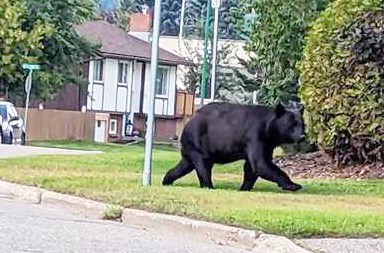Calls to the BC Conservation Office to report bear sightings are three times the volume they were last year at this time and that’s expected to continue as they look to feast on fruit trees and garbage bins.
Virtually every neighbourhood is seeing more bear activity and it’s more noticeable this year because of a loss of habitat caused by new housing construction, says UNBC professor Annie Booth.
“They know fall is almost here and they need to fatten up and it looks like everybody’s had quite a lot of cubs this year,” said Booth. “Because of all the heat and smoke it’s been a hit-and-miss berry season. In some places the berries have been pretty good and in other places they really haven’t been so there’s not a lot available, particularly when humans are competing for them,” she said.
Unfortunately, bears become habitual feeders of fruit trees or what gets dumped in residential garbage bins and they lose their natural fear of humans.
“I think they are actually getting habituated, if you look at the neighbourhood sites,” said Booth. “Bears are wandering into neighbourhoods and they don’t seem at all concerned, so you’re probably seeing a lot of return customers.”
She said urban bears have more predictable food sources and as a result they grow bigger and their cubs are more likely to survive and they live longer than bears who never go into cities.
In 2022, Prince George led the province for a second-straight year for the number of bears that were euthanized by the provincial authority. Booth said the majority of those bear deaths could be prevented if people would make use of bungee cords to tie down the lids of their garbage containers or keep the bins stored in garages until collection day.



